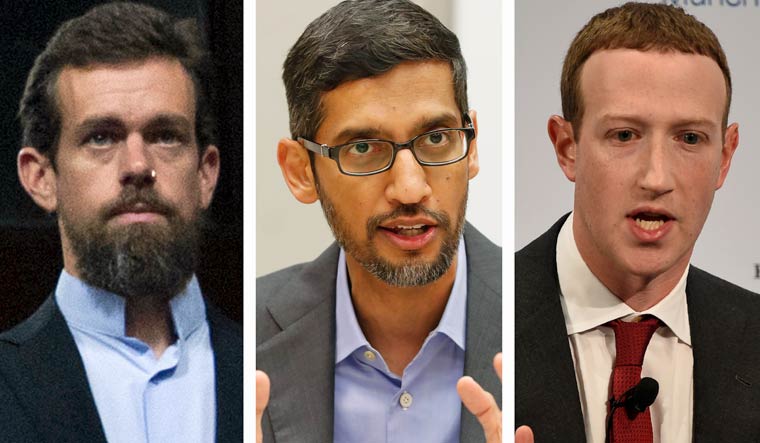On Tuesday, tech giant Google suspended the US-based, "free-speech oriented" microblogging platform Parler from its app store, citing posts inciting violence and demanding "robust" moderation, the same day that Twitter permanently suspended US President Donald Trump's account. The incident had come on the back of protesters, supporting Trump, storming the US Capitol a few days back. Parler had seen a surge in supporters of Trump, and there were reports that Trump himself could set up his base there, as all big social media companies initiated something of a purge on their systems. Google was not alone in pressuring Parler to initiate content moderation. Apple also warned the company that it will ban the service from its app store.
Parler's CEO John Matze in a post challenged Apple's position. "Apparently they believe Parler is responsible for all user generated content on Parler. By the same logic, Apple must be responsible for all actions taken by their phones. Every car bomb, every illegal cell phone conversation, every illegal crime committed on an iPhone, Apple must also be responsible for," he said.
"We will not cave to pressure from anti-competitive actors! We will and always have enforced our rules against violence and illegal activity. But we won't cave to politically motivated companies and those authoritarians who hate free speech," he said.
Social media in aftermath of US riots
The violence in the Capitol in Washington DC came, according to reports, after weeks and months of organisation on social media. With mounting pressure from public and lawmakers to prevent a repeat of such an incident, Facebook and Instagram suspended Trump at least until Inauguration Day. As news agency AP reported, Twitch and Snapchat also have disabled Trump’s accounts, while Shopify took down online stores affiliated with the president and Reddit removed a Trump subgroup. Twitter also banned Trump loyalists including former national security advisor Michael Flynn in a sweeping purge of accounts promoting the QAnon conspiracy theory.
More than 300 Twitter employees had urged the company to permanently ban Trump from the platform.
But the social media companies know better than anyone else the slippery slope that they are perched on. Sections of US lawmakers, irked by the censoring policies of the big tech, have frequently called for the removal of Section 230 of the Communications Decency Act, the liability shield for the Big Tech.
The importance of Section 230 cannot be overstated. It is the foundation upon which social media and third party-generated-content companies function. For instance, if User 1 posts content on social media and User 3 finds it defamatory, User 3 can sue only User 1, not the social media platform which published the content. Once the liability shield is removed, and the companies become publishers rather than platforms, they will be faced with a daunting task of regulating millions of users spread across their platforms. That could spell the end of such companies.
Now, faced with massive pressure from all sides, the social media companies are at that point of inflection.
Political criticisms of the move
Popular Indian-American politician Nikki Haley condemned Twitter, saying that the "US is not China". "Silencing people, not to mention the President of the US, is what happens in China not our country," tweeted Haley on Friday.
US Secretary of Housing and Urban Development, Dr Ben Carson, joined Haley in opposing the Twitter's move. "Silencing a significant number of voters and erasing history is no way to unite us; it only further divides. Big tech and social media platforms want to act like media organisations but don't want to be held accountable with the rest of media. Speech should be free whether you agree or not," he said.
The president's son, Donald Trump Jr, likened the Twitter's move to George Orwell's 1984. "We are living Orwell's 1984. Free-speech no longer exists in America. It died with big tech and what's left is only there for a chosen few. This is absolute insanity, he tweeted. "Mao would be proud," he said in another tweet, referring to Mao Zedong, the founding father of the People's Republic of China.
Back in India, BJP leaders expressed concern on Saturday over the permanent suspension of Trump's Twitter account. "If they can do this to the President of the US (POTUS), they can do this to anyone. Sooner India reviews intermediaries' regulations, better for our democracy," BJP's youth wing president Tejaswi Surya said in a tweet.
He said the suspension of Trump's account is a wake-up call for those who do not yet understand the threat to democracies from unregulated big tech companies.
Echoing similar sentiments, BJP's IT cell head Amit Malviya said "deplatforming Donald Trump, a sitting US president, sets a dangerous precedent. It has less to do with his views and more to do with intolerance for a differing point." He said those who claim to champion free speech are celebrating and dubbed big tech firms as "new oligarchs".
-Inputs from PTI




